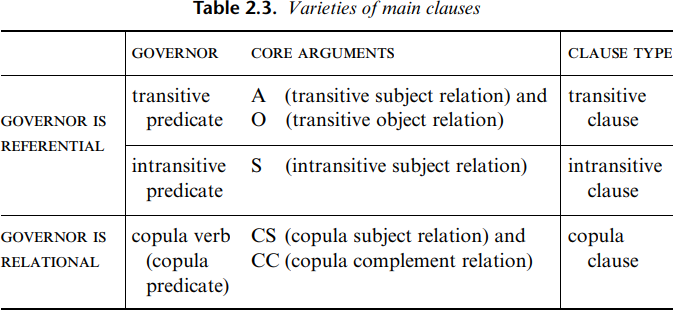


 Grammar
Grammar
 Tenses
Tenses
 Present
Present
 Past
Past
 Future
Future
 Parts Of Speech
Parts Of Speech
 Nouns
Nouns
 Verbs
Verbs
 Adverbs
Adverbs
 Adjectives
Adjectives
 Pronouns
Pronouns
 Pre Position
Pre Position
 Preposition by function
Preposition by function 
 Preposition by construction
Preposition by construction
 Conjunctions
Conjunctions
 Interjections
Interjections
 Grammar Rules
Grammar Rules
 Linguistics
Linguistics
 Semantics
Semantics
 Pragmatics
Pragmatics
 Reading Comprehension
Reading Comprehension|
Read More
Date: 2024-07-14
Date: 2023-03-20
Date: 2023-11-03
|
Each main clause has an ‘argument governor’ (which is the predicate) and one or more ‘arguments’, which are in grammatical relationship to the governor. English has three varieties of main clause, as shown in Table 2.3.
In each clause type, the predicate is a verb phrase and each argument is a noun phrase. As the term ‘predicate’ is used here, it does not include an NP. For example, in John will be interviewing Mary, the predicate is will be interviewing (not will be interviewing Mary); and in Mary was a good dancer the predicate is simply was (not was a good dancer).


All NPs have reference to a concrete or abstract entity (for example, the tall woman or sincerity), and all transitive and intransitive VCs have reference to a concrete or abstract activity or state (for example, fall or kick or like). In contrast, a copula expresses a relation between the CS and CC arguments. And whereas A, O, S and CS are realized by NPs with essentially the same structure, the possibilities for CC are somewhat different. By far the most common copula in English is be; the possibilities for its CC are set out in Table 2.4.
Many languages require a verb of rest or motion to be included with a locational expression, saying something like She is staying in Prague or She is going to Vienna. English can use just the copula to describe a position of rest, e.g. She is in Prague; but a verb of motion must normally be included with any specification of motion ‘to’ or ‘from’—that is, going cannot be omitted from She is going to Prague. There is an interesting exception: the ‘previous’ auxiliary have plus copula be can be used with a to phrase, without a verb of motion, e.g. She has been to Prague (with the meaning ‘she went to Prague at least once’).
The other copula verbs in English include become, which can be followed by (i) an NP, or (ii) an adjective (She became a doctor/my wife/sick) and get, come, go, grow, turn, feel, each of which may only be followed by a restricted set of adjectives, e.g. get dirty, come true, go bad, grow stupid, turn green. Whereas become only functions as a copula and be only as copula and in the imperfective and passive auxiliaries, the other five also have non-copula uses; indeed, their lexical and copula uses can merge— compare He turned/grew sad with He turned/grew into a sad man.
A main clause in English generally includes a subject, which precedes the predicate. Intransitive verbs have a single core role and this must be intransitive subject (referred to as ‘S’ relation). Transitive verbs have two or more core roles, and that role which is most likely to be relevant for the success of the activity is in transitive subject relation (referred to as ‘A’).
A transitive verb must also have a role in object (O) relation, and this will immediately follow the predicate. After an intransitive predicate, or a transitive-predicate-plus-object or a copula-predicate-plus-copula complement, a clause may include one or more peripheral NPs (each introduced by a preposition), referring to recipient (give the book to Mary), or beneficiary (take the book for Mary), or instrument (shave with a razor), or reason (do it for money/kicks) etc.; and also one or more spatial or time or frequency or manner expressions .
|
|
|
|
دراسة تحدد أفضل 4 وجبات صحية.. وأخطرها
|
|
|
|
|
|
|
جامعة الكفيل تحتفي بذكرى ولادة الإمام محمد الجواد (عليه السلام)
|
|
|